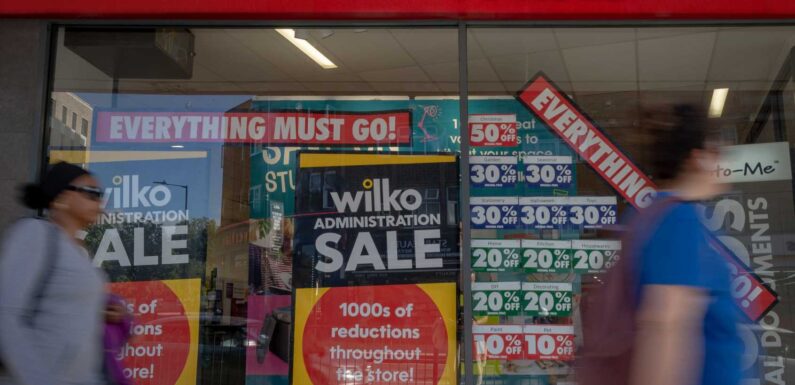
SHOPPERS have been issued with an urgent warning over fake retail websites offering discounts that are "too good to be true".
Consumers have been taking to Twitter and Facebook flagging fake websites associated with retailers such as Wilko and Joules.
Wilko has already launched a giant in-store sale after falling into administration, but a number of scam websites appear to be looking to capitalise by offering fake goods.
Cath Kidston and Joules customers are being targeted too.
In some cases, customers have paid money for items that have not arrived while others have spotted overinflated discounts.
Now, Action Fraud has issued an urgent warning over the dud websites looking to take advantage of shoppers seeking out closing down sales.
Read more in Retail
High street chain with 1,400 branches to close store for good by end of month
Big high street shop to shut store for good in hours in new wave of 100 closures
Pauline Smith, head of Action Fraud, said: "If you think you have found a bargain that is too good to be true, it probably is.
"Stop and think before making a purchase as it could protect you and your money."
It comes after Cath Kidston and Joules went bust earlier this year, seeing dozens of their stores closing across the UK.
Meanwhile, Wilko's future hangs in the balance, leaving the fate of hundreds of stores and thousands of jobs up in the air.
Most read in Money
McDonald's fans left fuming over favourite item suddenly gone from menus
Big high street shop to shut store for good in hours in new wave of 100 closures
I was bullied for love of gaming – now I earn £7k a month from my bedroom
Four huge banks with hundreds of branches to shut over a dozen more within days
Scammers have been looking to capitalise on these retailers going out of business by launching fake websites.
Shoppers have been complaining about fake websites associated with the Cath Kidston name.
One tweeted recently: "@Cath_Kidston have I been scammed?
"I ordered a few bits on your website in the sale now your website has disappeared. Money's been taken."
Another added: "I bought a backpack more than 10 days ago and my order is still not shipped…
"It is impossible to contact you on your website."
Meanwhile, Wilko shoppers have been reporting similar issues.
One said today: "Watch out fake 'Wilko' websites popping up offering huge discounts. Please beware SCAM SCAM."
Joules shoppers have been urging fellow customers to look out for scam sites too.
One on Facebook said: "Please be careful on Facebook.
"There are advertisements for clearance sales for some of our high street shops, that are fake!
"I was almost caught out by a Joule's link, women's pj's ordinarily £50 were marked as a fiver.
"With wellies at £6, I was having a field day."
How to spot and report a scam
There are some common red flags which tell you if a website is fake.
Usually, one major sign is a URL which doesn't look quite right – this is the text found in the top half of your computer screen.
For example: www.joulesukmall.com is one such fake URL which has been reported by one shopper on Facebook.
Meanwhile, if the website you click on to does not exist, that's another telltale sign.
If you do land on to a website URL and it's a non-existent page, make sure you run an anti-virus sweep on your computer fast.
The website may have downloaded malware on to your computer which can be used to extract personal information from you.
You should change your passwords, starting with your bank and credit card accounts as well.
Another red flag is bad grammar – if there are spelling mistakes on the website for example.
If you have gotten to the stage where you have gone on to a scam website and bought a fake item, you should contact your bank immediately.
If you've been left out of pocket by the scam, you might be due a refund from your bank.
If they refuse to refund you, you can always go to the Financial Ombudsman Service.
It is an independent body that settles disputes between consumers and financial businesses and is free to use.
It might be able to help you get any lost money back, but there are no guarantees.
If you've been targeted by a phishing email, text or call, you can report them to [email protected], 7726 or via the National Cyber Security Centre's website.
You can also call the Action Fraud helpline on 0300 123 2040.
How to prevent a scam
There are a number of ways you can stop yourself from being scammed in the first place.
Action Fraud says it's worth making sure you know you can trust the website you are buying off.
You can do this by looking online for reviews of the website or person you are buying from.
If they stack up, you should be fine to make a purchase.
Next, make sure to use a payment method offering buyer protection, such as a credit card.
Most major credit card providers will help you get your money back if the item is faulty or damaged, or it never arrives.
Read More on The Sun
A Place in the Sun’s Laura Hamilton flooded with support from fans
Brit tourist drowns in Turkey after jumping into river during family holiday
Third, make sure you have strong passwords on your computer, mobile phone or device you are using to purchase the items.
This will ensure it's harder for criminals to get access to your personal information if they get access to your computer or phone.
Do you have a money problem that needs sorting? Get in touch by emailing [email protected].
You can also join our new Sun Money Facebook group to share stories and tips and engage with the consumer team and other group members.
Source: Read Full Article









